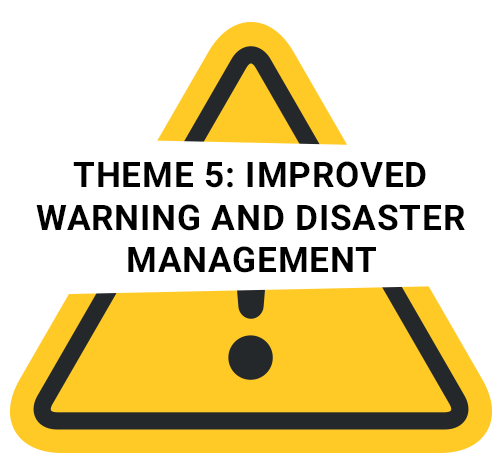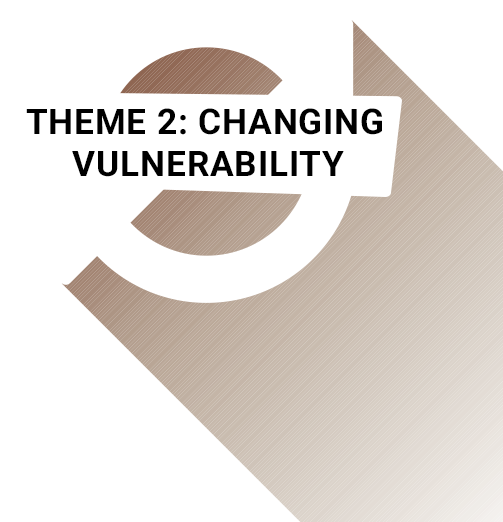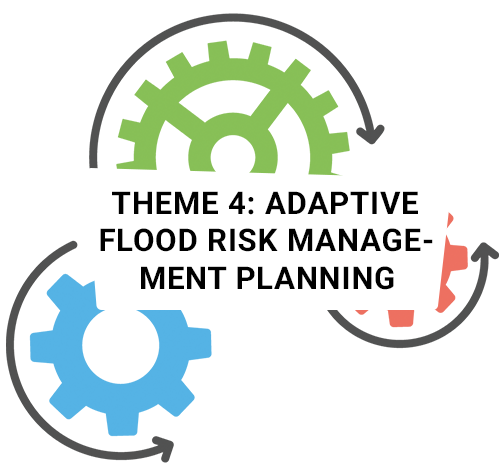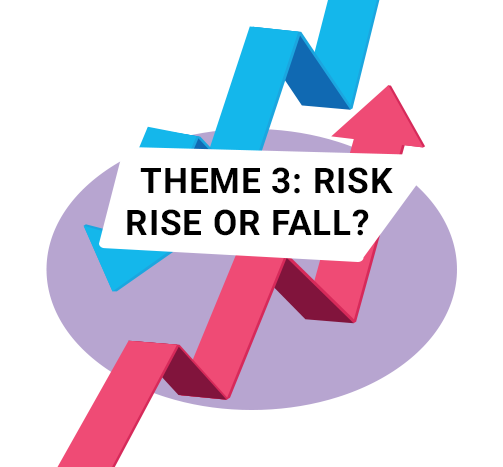My FLOODrisk 2020 Schedule
Select the sessions you wish to attend by clicking on the icon from the programme page and then view your schedule here.
Tuesday 22 June 2021
No sessions selected
Wednesday 23 June 2021
No sessions selected
Thursday 24 June 2021
No sessions selected
Programme
Note: all times are in Central European Summer Time
Tuesday 22 June 2021
-
9.30 - 9.40:Prof. Józsa János, Rektor - BME
-
9.40 - 9.50: The FLOODrisk conference series – the journey so farDr. Jonathan Simm - HRW
-
9.50 - 10.00: How to get the best out of the FLOODrisk 2020 conferenceMrs. Estelle Morris - Samui
-
11.00 - 11.20: Development of flood risk in the past and in the futureGuenter Bloeschl - TU Wien and EGU chair of
-
11.20 - 11.40: Measuring community flood resilience across the globeReinhard Mechler and Adriana Keating - IIASA
-
11.40 - 12.00: Supporting flood risk management in Europe - overview and recent developmentsPeter Salamon - JRC
Vice-Chair: Matthijs Kok
- 13_1: An assessment of best practices of extreme weather insurance and directions for a more resilient society- Dr. Paul Hudson
- 11_15: The benefits of conserving foreshore vegetation- Timothy Tiggeloven
- 13_26: International Guidelines on Natural and Nature-Based Features- Dr Todd Bridges
- Poster: 13_10: Sponge cities and sustainable drainage systems: sharing best practice in China and the UK- Ms. Lisa Stewart
- Poster: 12_16: Impact of river interventions on flood water levels near river bifurcations- Matthijs Gensen
Led by: Rémy Tourment and Elena Sossenkina
The session will commence with the following presentations:
- General introduction on risk framework for levees and flood defences - Rémy Tourment
- Combining deterministic and probabilistic approaches to make decisions - Dr Jonathan Simm
- Decision making for flood risk management and for levee systems management - Elena Sossenkina and Dr Mike Sharp
This will be followed by questions and answers and open discussion stimulated by the presentations
Led by Laszlo Balatonyi and Gheorghe Constantin
The Preparedness and response activities in the Danube Region session aims at introducing the EU Strategy for the Danube Region (EUSDR) Environmental Risks Priority Area (PA5) and its Disaster Management Working Group (DM-WG). The focus will be tailored to preparedness and response activities, with special focus on Tailings Management and related initiatives of the International Commission for the Protection of the Danube River (ICPDR) Accidental Pollution Control Expert Group (APC EG). The session will be concluded by sharing the latest information about possible funding instruments to achieve better preparedness and more effective response in the region.
- Introduction: of the EU Strategy for the Danube Region, Environmental Risks Priority Area (05) Dr. László Balatonyi / Gheorghe Constantin
- Challenges in the Danube Region –
- Strategic partnership in the Danube Region: EUSDR PA5 – Dr. László Balatonyi
- Preparedness and response:
- Remote sensing, as one of the potential technologies (Dr. Tibor Bíró, NUPS)
- Case study of a tailing management facility disaster - consequences and overall effect on the Hungarian disaster response system (Kolontár, HU) tbc
- The EUSDR PA5 Disaster Management Working Group – Zsolt Kelemen
- Ongoing projects and funds related to Preparedness and response activities – Kinga Perge
- Activities of ICPDR APC EG
- Tailing Management in the Danube Region – Ádám Kovács
Vice-Chair: Péter Torma
- 1_23: How climate change induced storm clusters affect water levels along the Dutch coast- Prof.dr Suzanne Hulscher
- 1_25: Influence of water depth on wave overtopping- Menno de Ridder
- 1_117: Assessing flood levels in shallow lakes- Dr. Tamas Kramer
- 1_119: Storm Surge Contributions to Flood Hazards on Canada's Atlantic Coast- Mitchel Provan
- Poster: 1_21: Effect of storm climate trends and uncertainties on Dutch levee design- dr Jacco Groeneweg
- Poster: 9_24: On the choice of storms for flood risk and safety assessment- Dr. Sofia Caires
- Poster: 11_13: Effect of sea level rise on the overtopping of English coastal defences- Dr Dominic Hames
Vice-Chair: Gergely T. Török
- 22_4: Control over one’s environment? Leveling political capabilities to advance procedural justice in Flood Risk Management- Lieke Brackel
- Poster: 7_10: Coping and adaptation to coastal erosion and flooding and the role of local social capital. The cases of Keta and Ada along the Southeastern coast of Ghana.- Mr Sule Ayannor Issaka
- Poster: 9_31: Evaluation of vehicle instability risk in fords - Ricardo A. Bocanegra
Vice-Chair: Mr. Mark Morris
- 7_5: Sentinel data for flood disaster monitoring and assessment: case studies in Romania- Dr Gheorghe Stancalie
- 7_8: On the implementation of the French methodology for flood damage assessment to economic activities.- Miss Marta Galliani
- 2_28: Impact of climate change on Hungarian Water Management Strategy- Dr Laszlo Balatonyi
- Poster: 7_1: Assessment of Agricultural Damage under Different Simulated Flood Conditions- Mr Md Nurul Kadir
- Poster: 10_2: Understanding human behaviour dynamics for better prediction of flash flood social impacts: Insights from post-flood surveys analysis- Mr Javed Ali
- Poster: 24_3: Flood Damage Assessment in Support of the Definition of Risk Mitigation Strategies: The Case of Lodi- PhD Daniela Molinari
- Poster: 9_6: Flood Impacts across Scales: towards an integrated multi-scale approach for Malaysia- Dr Vicky Bell
- 10_4: A comparison of preferences in flood risk communication from the perspective of Dutch and English residents- Karin Snel
- 16_5: Creative participatory river ‘daylighting’: working with children as hydrocitizens in visioning future adaptations to local flood risk- Prof. Lindsey McEwen
Vice-Chair: Timothy Tiggeloven
- 12_8: Effectiveness of flood retention basins under hydrologic uncertainty- Joost Pol MSc
- 9_19: Accounting for peak attenuation in flood risk management in the River Meuse, the Netherlands- Nathalie Asselman
- 21_4: Towards a research agenda for sustainable sediment management in the Rhine River Basin- Dr. Ralph Schielen
- 13_25: Innovative tools for improving flood risk reduction strategies: the FLORIS project- Prof. Giuseppe T Aronica
- Poster: 18_5: Adapting to the impacts of pluvial flooding: Results of a household survey in three German municipalities- Lisa Dillenardt
- Poster: 12_24: Odra River Basin Flood Protection Project - implementation of the flood risk management plan- Rémy Tourment
Vice-Chair: Heather Murdock
- 19_6: Quantitative assessment of evacuation measures in flood-prone areas- dr.ir, Bas Kolen
- 18_6: Emergency Flood Control – Large-Scale Testing and Cost Analyses of Sandbag Schemes and Alternative Mobile Protection Systems- Prof. Baerbel Koppe
- 17_15: Web and App-based management of flood emergency plans at local entities level- Mr Javier Loizu
- Poster: 19_3: BresDefender: A potential emergency measure to prevent or postpone a dike breach.- D. Janssen
- Poster: 18_2: Risk-based decision-making in case of a threat for flooding- dr.ir, Bas Kolen
- Poster: 18_3: Regional guide lines for flood risk assessment and emergency response: participatory approach and IT tools for risk management.- Engineer, PhD Tiziana Bisantino
Vice-Chair: Lisa Stewart
- 11_5: Bayesian multilevel modelling to improve the transferability of residential flood losses model- MSc Guilherme Samprogna Mohor
- 19_4: The effect of improved mortality functions and evacuation insights on loss-of-Life risk assessments- Dr Karin de Bruijn
- 11_9: A new model for consideration of flow velocity in flood damage and loss prognosis- Dr.-Ing. Holger Maiwald
- Poster: 4_7: Resilience Index of Flood Prone Communities in Ibadan, Nigeria- Dr Felix Olorunfemi
- Poster: 11_21: Practical indicators for road infrastructure resilience to flood risks in France, case study of Nantes Ring Road network- Zhuyu Yang
Vice-Chair: Wouter Jan Klerk
- 1_20: The Vulnerability of Damaged River and Lake Dikes for Wave Overtopping- Vera van Bergeijk
- 1_22: The failure probability of grass erosion due to wave overtopping. A case study of the Afsluitdijk, The Netherlands- Dr. Jord Warmink
- 17_13: An Overview of Current Knowledge and Challenges in Predicting Breach Through Dams and Levees- Dr. Mark Morris
- 3_11: Advances in Levee Reliability Assessment Using Transient Seepage and Slope Stability Models to Simulate Levee Performance during Storm Events- Dr. Martin Schultz
- Poster: 17_14: Industry Research into Dam and Levee Breach Erosion Through Coarser Grained Materials- Dr. Mark Morris
Led by: Adrian Schmid-Breton and Jan Kruijshoop, International Commission for the Protection of the Rhine (ICPR)
What are the water management challenges facing (international) river basins and what can they do to meet them? What can (international) river basins do to prepare and adapt to future changes?
Organised and moderated by the International Commission for the Protection of the Rhine, the oldest international environmental river commission in the world, and accompanied by other river basin organisations from all over Europe this session address the issue of preparing (international) river basins for the effects of socio-economic and climatic changes, with consequences on discharge (floods, low water & droughts), the use of the water and water availability. To answer these challenges a strong cooperation within river basins is fundamental. Collaboration between river basins themselves could be also highly beneficial. The session goes beyond solely managing flood risks.
After an introductory presentation by the ICPR on the new integrated Rhine 2040 programme and the work related to CC and (quantitative) water resources management, the participating basin organisations and international institutions will share their experiences on future challenges and ongoing programmes/projects in the form of a round table discussion and Q&A. Possibilities for further (international) interbasin exchange and cooperation will be explored.
In addition, the public will have the opportunity to ask questions to the various organisations present and to participate in the debates. Questions submitted beforehand by the public will be addressed within the session. Additionally questions from the audience can be asked via chat during the session.
Wednesday 23 June 2021
-
9.00 - 9.20: Modelling chain and results of generating Future Weather, rainfall-discharge modelling, river routing and the derivation of future river discharge regimes in a large catchment (exemplified for the Rhine). Summary of the joint work of a number of (inter)national (mainly German and Dutch) expert scientists and agencies on this as well as sketch a perspective for future research and application.Mark Hegnauer - Deltares
-
9.20 - 9.40: Nature-Based Solutions for Flood Mitigation and the Evaluation of their Co-Benefits: Examples from the Danube River BasinFrancesca Perosa - TU Munchen
-
9.40 - 10.00: Systemic flood risk management planning: accounting for risk-distribution across flood-protected areas and deeply uncertain hydraulic interactions.Alessio Ciullo - ETH Zurich, CH
Vice-Chair: Karin de Bruijn
- 21_1: Evaluating past and future flood risk reduction in the Rhine river basin- Adrian Schmid-Breton, Nikola Schulte-Kellinghaus
- 12_27: An advanced framework of flood risk management: The outline- Prof. Jochen Schanze
- Poster: 8_7: Flood risk management in Hungary- Éva Csengeriné Veczán
- 19_2: Enhancing the resilience of levee systems through methodological developments- Mr. Marc Igigabel
- 24_7: Risk Informed Decisions for Levees- Dr. Michael Sharp
- 14_9: Serious gaming as an innovative means for handling complexity in flood risk reduction- ir Frank den Heijer
- 14_10: Existing levee system economic evaluation methodology- M Edouard DURAND
- Poster: 12_3: The four components to combine flood protection with other functions- Richard J.C. Marijnissen
- Poster: 8_3: Daily and seasonal deformations of a Dutch Levee along a tidal river and during dry and wet conditions.- Dr. Meindert Van
Vice-Chair: Gadadhara de Figueiredo Ferraz
- 17_6: A simple conceptual model for coupled hydrological-hydraulic simulation in large basins with significant flood-propagation effects.- Mrs. Beatriz Tejerina
- 9_16: Spatio-temporal mapping of European floods of record- Prof. Attilio Castellarin
- 3_6: Design flood assessment on the upper Rhine using historical data and accounting for discharge uncertainty- Dr. Michel Lang
- 7_11: Causes of heavy tails in flood peak distributions- Prof. Bruno Merz
- Poster: 9_11: River-dike-floodplain system Interactions and temporal dynamics for large-scale flood risk assessment- Mr Mostafa Farrag
- Poster: 3_5: Climate change allowances, non-stationarity and flood frequency analyses- Adam Griffin
Vice-Chair: Paul Hudson
- 17_3: Flash flood impacts nowcasting within the PICS project (2018-2022): End-users involvement and first results- Pierre Javelle
- 17_12: A tailor-made 1D hydrodynamic modelling solution for flood forecasting on the Danube catchment- Dr Zoltán Liptay, Dr Balázs Gauzer
- 6_6: Cross-border flood warning and forecasting in the Raab river valley- Dr Tamas Kramer
- Poster: 17_1: Toward a user-based fast running method for coastal flooding forecast and early warning- Dr. Deborah IDIER
Vice-Chair: Timothy Tiggeloven
- 6_8: Flood risk assessment in underground transport systems in a context of climate change - A case study of the Barcelona metro system- Mr. Edwar Andres Forero Ortiz
- 3_12: Continuuous assessment of the resilience of critical infrastructure: the Nantes ring road flood experimental scenario- Hélène Dolidon
- 19_12: Investigating the Importance of Critical Infrastructures’ Interdependencies during Recovery; lessons from Irma Hurricane in Saint-Martin’s Island.- Dr. Rita DER SARKISSIAN
- Poster: 6_4: Flood hazard associated with extended linear infrastructures: a simplified methodology to assess and manage it- Alessio Domeneghetti
- Poster: 13_18: Young investigator group on improving the flash flood resilience of critical infrastructures: benefiting from interdisciplinary experience- Dr. Sebastian Golz
- 14_1: Predictive condition-based monitoring for low utilisation motor driven flood risk management infrastructure - Mr. Keith Solts
- 9_3: Detection of seepages and monitoring of structural changes in earthen embankments by FO DTS- Ing. Filip Čejka
- 14_6: Investigation, assessment and remediation of levee transitions- Dr. Jonathan Simm
- 24_8: A method to assess the failure probabilities of river levees based on Elicitation, Calibration, Aggregation, and Debiasing of expert judgement (IeCAD)- Pr Laurent PEYRAS
- Poster: 13_14: Self operating flood barriers: engineering application of hydrostatic principles for civil protection in an uncertain future - Dr Antonis TOUMAZIS
- 24_1: Assessing Climate Resiliency of Flood Risk Management Strategies in Finland - Mr Antti Parjanne
- 25_3: Long term flood risk management: Exploration of options for the Rhine River Delta under sea level rise scenarios- Dr. Karin de Bruijn
- 16_4: Climate Adaptation in Ireland- Dr Wolfram Schlüter
Vice-Chair: Pierre Javelle
- 17_11: Operational river ice and water temperature forecasting on the Hungarian Danube reach- Dr Zoltán Liptay, Dr Balázs Gauzer
- Poster: 17_9: Early warning system for flood forecast: from numerical weather prediction to an interactive web service- Paulo Fernandez
- Poster: 17_20: Transposition of a flash flood forecasting model developed for Mediterranean and Pyrenean catchments to river basins in Luxembourg- Audrey Douinot
Vice-Chair: Gergely T. Török
- 7_6: Post-event Flood Damage Surveys: A New Zealand Experience and Implications for Flood Risk Analysis- Ryan Paulik
- 3_9: Monitoring highly dynamic flood events: The Helmholtz initiative MOSES- Prof. Bruno Merz
- Poster: 2_27: Abnormal rainfall, extreme riverflow and disastrous flood in a tropical state of India- Dr. Shadananan Nair
- Poster: 7_7: Cloudburst Flash Flood Modelling: A case study- Dr. Anil Kumar Lohani
Led by: András Kis and Gábor Ungvári
Contributors: Lenka Slavíková, Nejc Bezak, Thomas Hartmann, Piotr Matczak
The Land4Flood community of scholars and practitioners is based on the shared understanding that the recent demand for flood defense by nature based solutions can only be accomplished if the engineering, legal and economic aspects of planning are considered as a comprehensive implementation process.
The special session will be built on the Land4Flood knowledge-network development, provides insight from this broadening pool of experience for the experts of the flood defense field and raises the awareness about the critical points of interconnections that can thwart successful realization flood risk mitigation.
Led by: Maria Pregnolato and Luke Prendergast
Sessions format:
- Short keynote presentation (Dr Prendergast)
- minute presentations from each attendant
- Discussion over a theme or break-out rooms over multiple themes e.g.
- Scour modelling
- Scour management
- Decision-support
- Prevention/mitigation
- Monitoring
- Sensors/approaches to detect scour
- Visual inspection assessment strategies
- Alternative assessment strategies
- Climate change related scour modelling
- Network resilience
- Combined damage modelling (scour and other damage)
Vice-Chair: Dr. Evalyna Bogdan
- 21_3: Flood Risk Management in the Danube River Basin – Transboundary Cooperation in the frame of the ICPDR- Mr. Clemens Neuhold
- 14_8: Adaptive asset management for flood protection: A perspective from the North-Sea Region- Mr. Paul Sayers
- 5_4: Floating and amphibious houses: A creative use for our valuable flood plains?- Prof. Edmund Penning Rowsell
- 4_5: How does culture affect individual adaptation to climate-driven floods?- Mr. Brayton Noll
- Poster: 10_1: Living with floods and land management strategies in Nepal - Dr. Zuzana Boukalova
- Poster: 25_2: A flood resilience observatory in French Polynesia: results and research perspectives from the ILOTS project- Bastien Bourlier
- Poster: 13_23: Advances in amphibious retrofit construction for flood risk reduction for vulnerable populations- Dr. Elizabeth English
- 4_1: Probabilistic loss modelling supports flood risk assessment under changing conditions- Dr. Heidi Kreibich
- 9_8: Analysis of uncertainty and sensitivity of coastal flood risk- Mr. Ben Gouldby
- 9_20: SENSITIVITY OF PLUVIAL SIMULATION IN THE CONTEXT OF NATIONAL-SCALE FLOOD MODELS- Ladislav Palan
- Poster: 11_2: Application of Big Data Methods in a Comprehensive Multi-Model Chain for the Assessment of Future Fluvial Flood Risk - Verena Maleska
- Poster: 9_5: Index-based flood risk assessment in Denmark: An adjusted approach with focus on vulnerabilities- Ms Kaija Jumppanen Andersen
- Poster: 11_4: Flood risk impact factor considering uncertainty in flood damage estimation- Professor Masaru Morita
- Poster: 9_13: Dike failure, sedimentation and uncertainties: a dynamic view of flood risks in the Koshi River, Nepal- Dr Julien Oliver
Vice-Chair: Bruno Merz
- 11_3: The “Flood Damage Models” repository- Daniela Molinari, PhD
- 4_3: People, not just places: Expanding social vulnerability indices by social-psychological factors- Dr. Sebastian Seebauer
- 12_26: Development of Vulnerability Module for Inland Flood CAT Models in Central European Countries- Raulina Wojtkiewicz
- Poster: 7_3: Discharge-damage curve and EAD estimates in the Pamplona metropolitan area (Spain) by using insurance data- Dr. Luis Mediero
- Poster: 9_15: A comparative analysis of flood damage models: lessons learnt and future challenges- Dr Chiara Arrighi
- Poster: 4_6: Vulnerability assessment in flood-prone areas of Mainland Portugal- Assis. Prof. Paulo Fernandez
- Poster: 11_14: Understanding flood vulnerability of buildings in US: A perspective through claims data- Raulina Wojtkiewicz
- Poster: 4_8: Flood risk vulnerability of Mallorca Island: an economic approach based on the territory values- Dr. Maurici Ruiz
Led by: Harm Rinkel, Stephanie Janssen & Ellen Tromp
Across Europe, the countries need to take measures – part of the EU Water Framework Directive – to protect the hinterland from flooding, such as dike reinforcement projects. At some locations, this appears to be difficult, partially due to the perceived challenges and hurdles around the Natura2000 legislation. Different approaches are followed both within and between countries. It is worth the effort to enhance the learning on these approaches in an attempt to safeguard both the threatened species and habitats as well as the inhabitants from flooding.
Programme:
16:00 Opening and introduction
Setting the scene by David van Raalte director at Waterschap Drents Overijsselse Delta
Interaction with participants
16:20 Case study presentations & Discussions
17:00 Group work – sharing experiences and best practices in combining Flood Risk Management and Natura2000
17:20 Session closure and next steps
Led by: Wout de Vries and Ludolph Wentholt
This special session is an open invitation to join us in a coalition of the willing to arrive at the International Handbook for Emergency Response to Flood Risk. It can also be seen as a stepping stone towards the International Community of Practice of Flood Fighters.
16:00 Introductions - Participants to enter in chat function their name, organisation, country, topics of interest
16.10 Interactive introduction, including topics Why a Handbook, Experience so far, Initial thoughts on the table of contents, Target audience, Expected outcome.
16:35 Practical aspects (interactive): How to arrive at a coalition, Position and future use of the Handbook, Proposed way of working, Roadmap to kickoff, other items to be considered.
17:00 Further discussion
17:30 Closure
Led by: Karin de Bruijn, Jason Needham, Woodrow Fields, and Paul Risher
This special session will survey current methods of flood fatality modeling from around the world. It will also give examples of how policy supports the use of that modeling for flood risk estimates. Presentations will be highlighted by a live demonstration of LifeSim as one example of a consequence model and followed by Q&A with the audience.
Vice-Chair: Heather Murdock
- 9_23: Debris-flow risk assessment to support mitigation design on Cheekeye River, British Columbia, Canada.- Kris Holm
- 7_14: Estimation of extreme flooding based on stochastic weather generators supported by a regional precipitation study and non-systematic flood data- Mr. Carles Beneyto
- 17_22: 2013 Monsoon Floods of Uttarakhand in India: What we have learnt from this event ?- Dr. S.K. Sharma
- Poster: 7_9: Hydrological modelling of Chenab catchment using satellite based rainfall estimates- Biswa Bhattacharya
- Poster: 18_9: Application of HEC-HMS for rainfall-runoff modelling in Mozambique and France- Mr Helder Guta
Thursday 24 June 2021
- 24_2: The use of historic flood events to reduce uncertainty in future flood frequency predictions: a bootstrap method- Dr. Anouk Bomers
- 2_26: Investigating ways to predict channel changes to inform flood risk management now and in the future- Mrs Hayley Bowman
- 3_3: Flash flood risk assessment for the German federal trunk road network - Kerstin Büche
- 7_4: Improving Situational Awareness for Floods: Monitoring Using Satellite Data in the Boreal Region- Juval Cohen
- 17_19: Improved Prediction of Atmospheric Rivers That Drive Flood Damages in the Western United States- Dr. Cary Talbot
- Poster: 10_3: The effect of depth-duration-frequency model recalibration on rainfall return period estimates and perceived flood risk- Lisa Stewart
- 19_1: Communication in crisis management – current status, needs and potential development areas- MRS Karolina Jankowska
- 21_2: DAREnet: A practitioner network to strengthen flood resilience in the Danube River region- Dr Christian J. Illing
- 19_7: International Handbook for Emergency Response to Flood Risk: A call for collaboration - Mr Wout de Vries (on behalf of Mr Bart Vonk)
- 19_8: Post-disaster reorganisation of local and national institutions: the case of St. Martin after hurricane Irma (West Indies)- Dr Gwenael JOUANNIC
Vice-Chair: Danny Janssen
- 8_2: Degradation of grass revetments: a comparison of field observations and structured expert judgement - Wouter Jan Klerk
- 17_21: Geophysical and geotechnical data fusion for protection dikes characterization- Dr Theo Dezert
- 17_10: Internal Erosion Breach Model Review and Validation- Dr. Mark Morris
- Poster: 11_17: A simple spatial variability model applied to dike system assessment of slope stability- Daniël Kentrop
- 9_4: Current and future flood risk in the Danube region using an open loss modelling framework- Kai Schröter
- 9_14: Impacts of climate change on regional flood risk in Queensland, Australia.- Ms Amanda Cheong
- 25_5: Next generation exploration of UK future flood risks: High resolution climate, population and adaptation futures- Paul Sayers
- Poster: 12_13: An assessment of future flood risk in the Awash Basin, Ethiopia to the 2050s- Mr. Paul Sayers
- Poster: 19_11: Review of state-of-the-art computational software for quantifying flood risk in coastal cities- Yuyang Shao, Yifan Zhang, S. Thomas Ng
- Poster: 12_25: Large-scale flood risk assessment and management: prospects of a systems approach- Kai Schröter
- Poster: 9_33: When physical vulnerability meets hazard: A simplified approach to assess flood risk in Historic Urban Areas- Tiago Miguel Ferreira
- 9_1: Assessing direct flood damages using open data in diverse urban environments- Dr. Dominik Paprotny
- 9_22: Acknowledging residual risk behind dikes: Examples from the USA, Quebec (Canada) and France- Dr. Anna Serra-Llobet
- Poster: 9_2: Considering 3D-objects within a 2D hydraulic modelling approach of pluvial flooding events- Dr. Matthias Stork
- Poster: 13_3: Pilot project EroL: Erosion events caused by heavy rainfall in Markgräflerland- Recommended actions for affected communities- Jessica Kempf
- Poster: 9_10: Pluvial flood risk assessment for the downtown area of Shanghai- Dr. Qian Ke
- Poster: 9_18: National Flood Mapping - Indicative fluvial flood map for Ireland- Mr Conor Galvin
Vice-Chair: Koen van Hattum
- 12_2: Tailored Flood Risk Management: how to design a site- and culture-specific strategy?- prof. dr Frans Klijn
- 12_12: How can we plan resilient systems of nature-based mitigation measures in larger catchments for flood risk reduction now and in the future? - Dr Barry Hankin
- 23_2: Modifying flood risk management in England to meet the needs of a changing future - Emily Clarke and Alisha Burke
- 3_7: Operating and optimising multifunctional urban flood protection - Lake Phoenix Dortmund- Alexander Hartung
- Poster: 14_13: How about the dikes? Managed realignment in progress at the Hedwige-Prosperpolder- Kim van den Hoven
- Poster: 12_29: Integrated Catchment Based Solutions- Ms Stephanie Dufour
- Poster: 12_30: The potential of reservoirs for both flood control and irrigation in the Sebou River (Morocco)- Mrs Benchbani Ikram
- 24_5: Examining the practical use of Dynamic Adaptive Policy Pathways in Danish Municipalities- Miss Mie Thomsen
- 13_11: Building Back Better Critical Infrastructures in a flooding context: Proposal of an operational approach - Mr. Anas DABAJ
- 12_20: Coping with flood risk adaptation in Mediterranean countries: evidences, uncertainties, strategies and limits- Prof Maria Carmen Llasat
- 13_29: Flood Adaptability Assessment in Low-lying Cities for Coping with Climate Change- Dr Yuto Shiozaki
- Poster: 1_1: Climate-Proof through Flood-Proof: Learning Better Defence in the ‘Living Lab’ of the Hedwige and Prosper Polder- Ludolph Wentholt
- 13_7: Assessing resilience to floods in an holistic perspective in French Polynesia- Bastien Bourlier
- 13_12: A Resilient Leadership for Resilient Cities- Mr Cheick Fousseni DIABY
- 25_6: Adaptation pathways and path dependencies: Insights into past and future decision-making in flood risk management- Dr. Sebastian Seebauer
- Poster: 6_7: Innovation to elevator maintenance for flood-prone buildings utilizing information and communication technology- Ms Jiduo Xing
- Poster: 12_28: A Cost Efficiency Analysis of Flood Proofing Measures for Hydraulic Risk Mitigation in an Urbanized Riverine Area- Ugo Ventimiglia
- Poster: 13_28: Concept of Grand Design for a Flood-Adaptable City – Toward Smart Urban Design with Both Familiarity to Water and Flood Hazard- Prof Takaaki Kato
Vice-Chair: James Miller
- 19_5: Towards a power outage driven response curve for modelling households evacuation decision-making: An empirical study of 2016 and 2018 floods in the Ile-de-France Region (France)- Dr Abla Mimi Edjossan-Sossou
- 19_9: A qualitative study of the impacts of flooding on the health and wellbeing of professional responders- Dr. Sally Priest
- 18_4: HEIMDALL: a technological solution for floods and multi-hazard management support- Stephanie Battiston
- 3_8: Data integration for rapid flood mapping and impact assessment - Kai Schröter
- 9_9: Pluvial flooding: hazard mapping and derivation of impact indicators- Dr.-Ing. habil. Regine Ortlepp
- 9_21: Comprehensive flood risk analysis at your fingertip through cloud-computing and standardized approach- Mr. Matthijs Bos
- Poster: 19_10: Review of state-of-the-art computational software for quantifying flood risk in coastal cities- Miss Yifan Zhang
- Poster: 11_12: Developing multivariable probabilistic flood loss models for companies- Lukas Schoppa
- Poster: 17_18: Forecasting river flood extent operationally using real-time 2D modelling- Dr. Tamas Kramer
- 12_19: New style flood risk management with faster hydrological models. From a practitioners perspective.- M.Sc. Joost van der Hammen
- 16_7: Enhancing flood risk governance and resilience with a serious role-playing game as an educational and engagement tool- Ms Heather Murdock & Dr. Evalyna Bogdan
Led by: Jonathan Simm, Jaap Flikweert, Matt Arthur
Transitions between levees (earthen flood embankments) and other hard structures are areas of weakness within an overall system of flood defences and can be found at any location, on or within a flood defence where there is a change in flood defence structure or of protection revetment (slope or crest, road, etc.), in an internal cross section and in the construction or foundation materials. The transition typically promotes the processes of internal and external erosion. If these processes are undetected, or left unchecked, they can ultimately lead to flood defence failure and breach. This special session outlines the results of UK research on the inspection, performance assessment and management of transitions. There will be plenty of time for discussion to explore experiences of attendees related to transitions, to compare different approaches in Europe and elsewhere to their assessment and management and to identify future research needs.
- 5_1: Improving urban flood estimation and flood risk assessment using landscape metrics - Dr. James Miller
- 14_4: Identification of River Defences from Digital Terrain Models using Deep Learning- Dr David Wood
- Poster: 3_1: Uncertainty estimate of flood hazard for an extreme flood- Mr André Paquier
- Poster: 11_19: Interdisciplinary approach to flood risk and the Consequence of Flooding- Eva Suarez
- Poster: 9_32: Development of flood mapping techniques and their efforts on flood assessment and management in European coastal cities- Zhuyu Yang and Maria Fabrizia Clemente
Vice-Chair: Joost van der Hammen
- 8_1: Managing drought effects on levees in England and The Netherlands- Dr. Marcel BOTTEMA
- 14_11: The new French regulation on flood protection works: consequences on risk management- M. Rémy Tourment
- 13_27: Sustainable Dredged Sediment Mangement to Support Storm Risk Management - Dr Joseph Gailani
- Poster: 11_11: DataBeach: Machine learning and probabilistic methods for soft coastal protection design and maintenance- Dr Aline Pieterse
- Poster: 12_23: Upcycling of local soil for sustainable levees in the Netherlands- Msc Carolin Briele
Led by: Dr Clare Twigger-Ross, Dr Simon McCarthy, Dr Jonathan Simm, Paula Orr and Rolands Sadauskis
There is much discussion around the involvement citizens and communities in the delivery of flood resilience. This interactive session draws on recent review work from England looking at the role of citizens and communities in flood and coastal erosion risk management activities, specifically in terms of managing uncertainty and future risks through adaptation and transformation (proactive resilience) to examine what the future of communities’ and citizen’s involvement might look like, the challenges and opportunities. The session will consist of:
- Current and possible futures for communities and citizens (Dr. Clare Twigger-Ross, CEP)
- Discussion in small groups: futures, challenges, opportunities (All)
- Challenge Panel and discussion on Communities’ and citizens’ involvement challenges and Opportunities – Where next? – Key experts from different perspectives in FCERM including Prof Lindsay McEwen
- Round up and final points
Led by: Karin de Bruijn, Heather Murdock, Shristi Vadya and Dr. Evalyna Bogdan
Urban areas are very vulnerable to floods and risk management in such areas is complex. In the event of a flood people and businesses in the urban environment often depend on the ability of the city and higher levels of government to cope. There are, however, many actors that need to be involved including not only water specialists and emergency managers but also urban planners, critical infrastructure operators, and the local community as a whole. This session will explore how damage and disruption can be reduced in a workshop format with consideration of the role of critical infrastructure and network effects using the Circle tool. This will include:
- Presentation on urban flood resilience (Dr. Karin de Bruijn)
- Workshop session using the CIrcle tool (Heather Murdock & Shristi Vadya)
- Debrief session (Dr. Evalyna Bogdan)
We invite anyone interested in enhancing urban flood resilience to join this participatory session.
Vice-Chair: Anna Serra-Llobet
- 12_6: Cost-Benefit Analysis and Feasibility Studies for Prioritization of Structural Measures in main river systems of Spain- Mrs Elena Martínez Bravo
- 13_8: Mapping resilience-building attempts to explore intra-floods reorganisation processes: Insights from recurrent flooding of the Seveso River (Milan, Italy)- Irene Bianchi
- 11_20: Shifting from asset damage to well-being loss within flood risk management- Koen van Hattum MSc
- Poster: 14_3: Flood risk assessment of the City of Calgary considering flood control barrier performance- Florence Mainguenaud
- Poster: 24_9: Keadby Terminal Assisted Outfall Pumping Station – Lessons learnt and a Blueprint for Strategic Asset Management in the Future- Mr Andrew Fenna
Vice-Chair: Kerstin Büche
- 6_2: Development of a flood damage model for urban drainage networks- Daniela Molinari, PhD
- 2_25: Flooding impact on bridges and roads: from asset- to network-level - Maria Pregnolato
- 6_3: Flood impact on critical linear infrastructures- Dr Chiara Arrighi
- Poster: 7_12: Fragility Assessment of Highway Bridges Subject to Flood-Induced Loads and Scour- Zuleyha Kanpara Civas
- Poster: 18_8: Examining the Operational Aspect of Pedestrian Evacuation Modelling; A case study of Ras-Baalbek flash floods–Lebanon.- Dr. Rita DER SARKISSIAN
-
16.00 - 16.10: Ready and resilient? The future of flood and coastal risk management in EnglandCaroline Douglass - UK Environment Agency
-
16.10 - 16.20: EU Floods Directive: Future Challenges for science and practiceClemens Neuhold - Federal Ministry of Agriculture, Regions and Tourism, Austria
-
16.20 - 16.30: From Convention to Action: Managing a Shared Basin - past and futureIvan Zavadsky - ICPDR
-
16:30 - 16:35: Awards best poster/ best paper / best presentationFrans Klijn - Deltares
-
16.35 - 16.45: Why Budapest – setting the scene in Hungary from a scientific point of viewTamás Kramer - BME
-
1645 - 17:00: Evaluation of the conference, thanks and closingFrans Klijn - Deltares

















